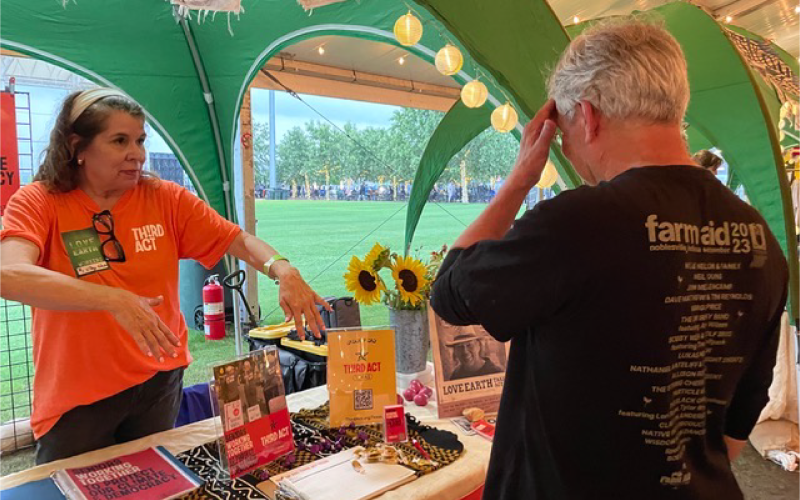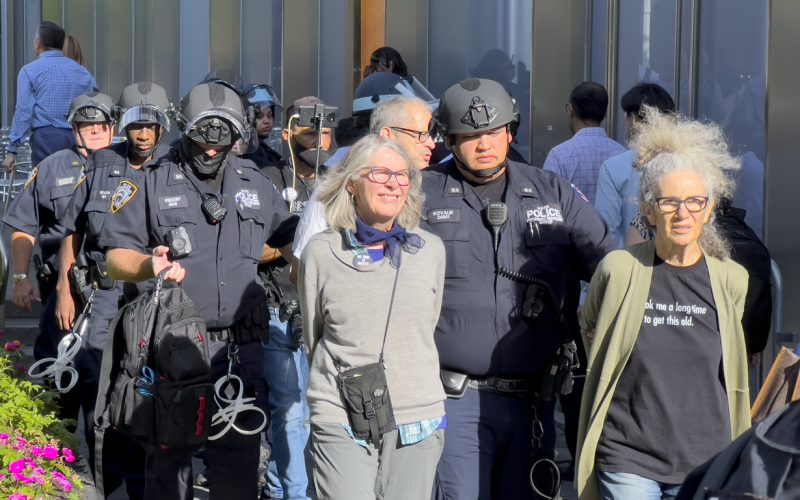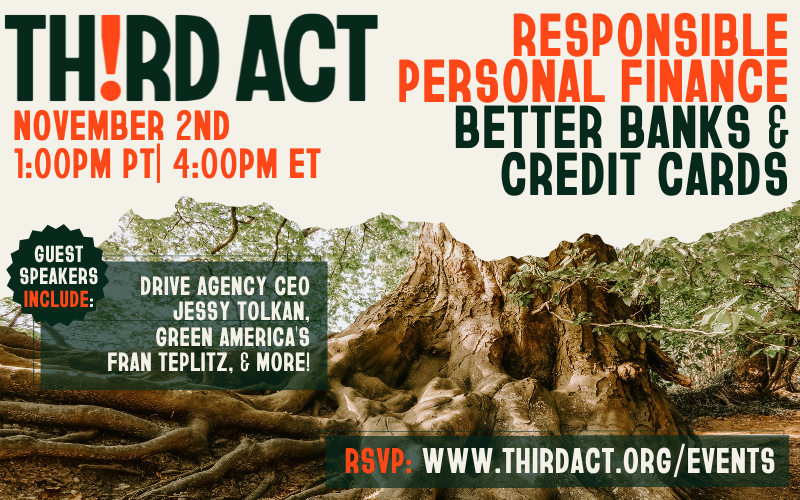On March 6, we hosted our all-in call with former Vice President and climate activist, Al Gore as our featured speaker, joined in conversation with Third Act Lead Advisor, Akaya Windwood, and Third Act Founder, Bill McKibben. Keep reading for the video and highlights from the event.
Al Gore In Conversation with Akaya Windwood and Bill McKibben
Below are excerpts from the call, edited for clarity and brevity.
Akaya: You’ve called yourself a recovering politician. And as you know, the political arena right now is very toxic. Young people are saying, I don’t want to sign up for this leadership because it looks so demoralizing and toxic. There’s a real reluctance and I’m concerned about that.
Given your history, what would you say to a brilliant, committed young leader who says, I’m not sure I want to lead right now?
Al: Well, first of all, may I begin by thanking you, Akaya, and Bill, and all of the leadership of Third Act for what you’re doing. It’s amazing. And thank you for inviting me to be a part of this. Before I turn to your question, I also want to add my enthusiastic endorsement to what you said earlier about Bill’s leadership on the press the pause button on the LNG terminals. Bill, you did a great job on that. Many people were a part of it, as you frequently say, but you were the real leader.
Akaya, to your question, I was in that situation myself, absent the brilliant and visionary adjectives you used, when I came back from Vietnam. Initially, I wanted nothing to do with politics. I was a journalist for five years and went to Divinity and law school. I’m a double dropout by the way. But I got involved in investigative journalism and I got pulled back into the idea of running for public office. When the congressman in my home district unexpectedly retired. I jumped into it. But in a more general way, the antidote for political cynicism and despair is political activism.
“The antidote to climate despair is climate activism.”
And you could say the same about climate despair. In fact, many of us have said that the antidote to climate despair is climate activism. In the years I was in political office I saw that more often than not, change comes from the bottom up. It comes from activists at the local level who got their act together and gathered others to make their case and keep at it until people listened and responded.
People often ask: what’s the one thing people can do? There are a lot of things, but more important than changing the light bulbs is changing the laws and the policies. The most important thing you can do is to get involved politically. Use your voice and use your vote. Don’t give up this climate movement. It is the latest in a series of morally-based movements. It’s useful to look back at the movement to abolish slavery, give women the right to vote, recognize the rights of gays and lesbians, anti-apartheid in South Africa, and the civil rights movement here. They all have a lot in common. There were times when the advocates felt despair and felt the kind of emotions that you framed in your question, Akaya, but they kept going. And once the underbrush was cleared away, the central question was revealed as a choice between what’s right and what’s wrong.
Bill: You’ve been in politics for a very long time. We talk a lot about the role of youth, which is important. But what are some of the distinctive qualities that older Americans bring to this?
“When [Roger Revelle] was a college student, the age I was when I took his course, he had a professor that inspired him and changed the direction of his life. Think about how many chains of inspiration stretch back in time and lead to changes in the present day.”
Al: Older people bring a lifetime of experience and some wisdom with them having gone through that lifetime of experience. A tendency to sort out the trivial from the important and focus on the latter. And if they’ve played their cards right, respect from younger people who know them and who have learned from them throughout the years.
When I was an undergraduate in college in the 1960s, I had no idea what the climate was all about. My inspirational mentor was a scientist named Roger Revelle. I walked into his course and he opened my mind. He really inspired me. Everything we’ve seen in the 50 odd years since then, he foretold. Years later, I went out to the Scripps Institute in La Jolla to honor his legacy on the 100th anniversary of his birth. I thought I knew all about him, but while I was researching for my speech, I found out that when he was a college student, the age I was when I took his course, he had a professor that inspired him and changed the direction of his life. And I thought about how many chains of inspiration stretch back in time and lead to changes in the present day.
I think that’s something that all of us who are of an old enough age to join Third Act ought to keep in mind. It’s a really important function and you cannot imagine how long into the future that inspiration might linger. In the case of Roger Revelle and the person who inspired him 100 years ago, it continues to have an impact.
Bill: Just so people know, it was Roger Revelle who led us to the establishment of monitoring up on Mauna Loa that started measuring CO2 in the atmosphere. That’s the most important scientific instrument in the history of science.
Al: David Keeling did it faithfully and now his son does. The Keeling Curve is the bedrock of all modern climate science.
Akaya: I’m appreciating all your optimism because this is a hard time for a lot of folks and it is not the time to camp out in the land of despair.
Take us out 30 years. Let’s imagine that it’s 2054. I call that the recent future. When you listen to your deepest inner wisdom and intuition, what do you imagine for us collectively?
Al: That future will be shaped by us and depending on what we do. It will be one way or another. But I would say this as a word of encouragement for those who are tempted to despair. You know the old saying denial is just a river in Egypt? You could, if you’re going to be corny, say despair ain’t just a tire in the trunk. It is a real problem that we have to deal with. But there’s a big wheel turning in the right direction and little wheels turning in the wrong direction.
If you ask people to guess how much of the new electricity generated worldwide built and installed last year came from solar and wind, most would be surprised to hear the answer is 86%. If you asked how many of the new car sales last year were electric vehicles, most would be surprised that it’s gone all the way up to 20%. For the two wheelers, it’s about 50%. We’re seeing the building of a new hydrogen-based steel plant in Northern Sweden and the industry is on notice. It’s one of many signs that circular manufacturing, green hydrogen, sustainable forestry, and regenerative agriculture are really moving quickly.
Yes, we hear the discouraging little wheels moving in the wrong direction with some of the bankers giving up on their pledges, but some of them are just changing their language a little bit. We’re still putting way too much money into fossil fuels and that needs to stop. But people are ready for change. Don’t get discouraged by the little wheels moving in the wrong direction. Look at that big wheel. We are going to solve this. We need to accelerate the change and I’m not going to be guilty of toxic positivity, as some of my kids say, but I’m very excited about it.
I’m very optimistic and encouraged, but it’s all premised on the people in Third Act and the Climate Reality Project and other organizations. We’ve got to make it real and we can.
The Climate Reality Project is hosting a training with former Vice President Al Gore and an all-star lineup on April 12-14 in New York City. You’ll learn what climate change means for you and get the know-how and tools to make a real difference. The training is free to attend. Sign up here.



